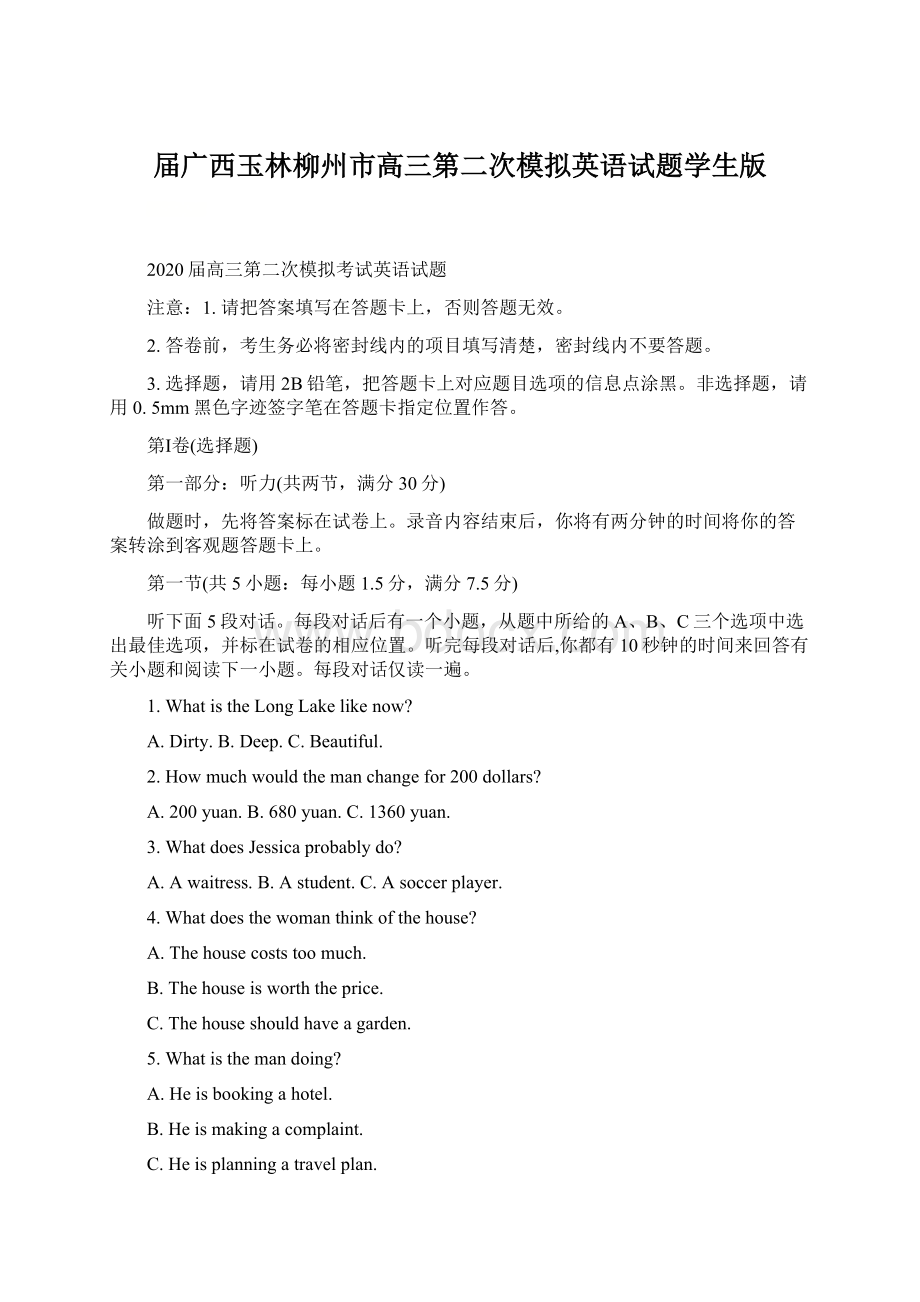届广西玉林柳州市高三第二次模拟英语试题学生版.docx
《届广西玉林柳州市高三第二次模拟英语试题学生版.docx》由会员分享,可在线阅读,更多相关《届广西玉林柳州市高三第二次模拟英语试题学生版.docx(11页珍藏版)》请在冰豆网上搜索。

届广西玉林柳州市高三第二次模拟英语试题学生版
2020届高三第二次模拟考试英语试题
注意:
1.请把答案填写在答题卡上,否则答题无效。
2.答卷前,考生务必将密封线内的项目填写清楚,密封线内不要答题。
3.选择题,请用2B铅笔,把答题卡上对应题目选项的信息点涂黑。
非选择题,请用0.5mm黑色字迹签字笔在答题卡指定位置作答。
第Ⅰ卷(选择题)
第一部分:
听力(共两节,满分30分)
做题时,先将答案标在试卷上。
录音内容结束后,你将有两分钟的时间将你的答案转涂到客观题答题卡上。
第一节(共5小题:
每小题1.5分,满分7.5分)
听下面5段对话。
每段对话后有一个小题,从题中所给的A、B、C三个选项中选出最佳选项,并标在试卷的相应位置。
听完每段对话后,你都有10秒钟的时间来回答有关小题和阅读下一小题。
每段对话仅读一遍。
1.WhatistheLongLakelikenow?
A.Dirty.B.Deep.C.Beautiful.
2.Howmuchwouldthemanchangefor200dollars?
A.200yuan.B.680yuan.C.1360yuan.
3.WhatdoesJessicaprobablydo?
A.Awaitress.B.Astudent.C.Asoccerplayer.
4.Whatdoesthewomanthinkofthehouse?
A.Thehousecoststoomuch.
B.Thehouseisworththeprice.
C.Thehouseshouldhaveagarden.
5.Whatisthemandoing?
A.Heisbookingahotel.
B.Heismakingacomplaint.
C.Heisplanningatravelplan.
第二节(共15小题;每小题1.5分,满分22.5分)
听下面5段对话或独白。
每段对话或独白后有几个小题,从题中所给的A、B、C三个选项中选出最佳选项,并标在试卷的相应位置。
听每段对话或独白前,你将有时间阅读各个小题,每小题5秒钟;听完后,各小题将给出5秒钟的作答时间。
每段对话或独白读两遍。
听第6段材料,回答第6、7题。
6.Whatdidthemanreadaboutbeforetheoneheisreading?
A.TwowomeninEurope.
B.AwomantravelingtoAfrica.
C.Amanbuildingahouseonamountain.
7.Whatdoesthewomanwanttodo?
A.Findanotherjob.B.Gobucktothe1940s.C.Traveleverywhere.
听第7段材料,回答第8、9题。
8.Whatarethetwospeakerstalkingabout?
A.Wheretogivetheconcert.
B.Howtoadvertisetheconcert.
C.Whowillperformintheconcert.
9.Whydothespeakersdecidetosendoutemailstotheirstudentsandtheirparents?
A.Toremindtheirstudentstoaskfortheirparents’permission.
B.Togetideasfromtheirstudents’parents.
C.Tomakesureeverystudentandtheirparentsknowabouttheconcert.
听第8段材料,回答第10至12题。
10
Whichcountrydoesthewomancomefrom?
ACanada.B.China.C.France.
11.WhendidthewomanstudyFrench?
A.Whenshewasveryyoung.
B.Whenshestudiedinhighschool.
C.WhenshebecameanEnglishteacher.
12.Whatisthekeytolearningalanguageaccordingtothewoman?
A.Attitude.B.StressC.Practice.
听第9段材料,回答第13至16题。
13.Whatdoweknowabouttheoldwoman?
A.Shecouldn’tspeak.
B
Shecouldn’tseeclearly.
C.Shecouldn’thearwell.
14.Whatdidthewomandotohelptheoldwoman?
A.Shetooktheoldwomantofindherhusband.
B.Shelenthercellphonetotheoldwoman.
C.Shetoldtheoldwoman’shusbandwheretheoldwomanwas.
15.Whyisn’tthewomangoingtoeatsteaks?
A.Shedoesn’tlikesteaks.
B.Therestaurantistoofar.
C.Shejusthadasteaktoday.
16.HowsoonwillthetwospeakersgettotheChinesefoodrestaurant?
A.Inabout15minutes.
B.Inabout30minutes.
C.Inaboutanhour.
听第10段材料,回答第17至20题。
17.Whatisthespeakerdoing?
A.Tellingstories.
B.Reportingsomenews.
CMakinganannouncement.
18.Whoarelookingaftertheabandonedbabynow?
A.Thevisitors.B.Thepolicemen.C.Thehospitalstaff.
19.What'stheresultofthecaraccident
AThreepeoplewerekilled.
B.Thepeopleinthecarsufferedslightinjuries
C.Thepeopleinthecargotseriouslyinjured.
20.What’stheweatherprobablylikeonTuesday?
A.Sunny.B.Rainy.C.Windy.
第二部分:
阅读理解(共两节,满分40分)
第一节(共15小题;每小题2分,满分30分)
阅读下列短文,从每题所给的四个选项(A、B、C和D)中,选出最佳选项,并在答题卡上将该选项涂黑。
A
InternationalVolunteeringinNewZealand
Ifyou’revisitingNewZealandandwouldliketovolunteer,DOC(DepartmentofConcentration)welcomesyoutogetinvolved.
BeforeyoucometoNewZealand
YoudonotneedaworkvisatovolunteerwithDOC.YouranvolunteeronentrytoNewZealandaslongasyoudonotreceivepaymentorbenefits.
Youmayneedapolicecertificate
Dependingonthevolunteerworkyoudowithus
youmayberequiredtoprovideapolicecertificatetoDOC.YourpolicecertificatewouldneedtobewrittenandcertifiedinEnglish.It’seasierforyouifyougetapolicecertificatebeforeyouleaveyourcountry.
Howtogetanewpolicecertificateifyou’realreadyinNewZealand.(Clickhere)
Internationalstudents
VolunteeringwithDOSisanoptiontogainexperience.However,DOCdoesnotofferopportunitiestostudentswhostudyat:
●universitiesoutsideNewZealand,orothereducationprovidersoutsideNewZealand.
Insurance
ForallvolunteerswithDOC,westronglyadviseyougelcomprehensive(综合的)travelinsuranceandunlimitedmedicalcover.DOCdoesnotacceptresponsibilityforany:
●personalmedicaloraccidentevents.
●lossordamagetopersonalitemsofequipment,orotherassociatedcostswhileyou'revolunteeringwithDOC.
1.WhatmayyouoffertoDOCifyouwanttovolunteerasaforeignerinNewZealand?
A.Aworkvisa.B.Apolicecertificate
C.Auniversitydiploma.D.Adriverlicense.
2.WhocannotvolunteerwithDOCinNewZealand?
A.AnAmericanofficialwhoistravellinginNewZealand.
B.AChinesebusinessmanwithsomevolunteeringexperiences.
C.AChineseexchangestudentintheUniversityofAucklandinNewZealand.
D.AnEnglishcollegestudentwhohasjustbeenvisitinghisuncleinNewZealandforafewdays.
3.Whereisthispassageprobablyfrom?
A.Astorybook.B.Anewspaper.
C.Awebsite.D.Atravelguidebook.
B
Dogslovetogetoutandstretchtheirlegs,whichnotonlyhelpstokeeptheminshape,butenablesthemtokeeptheextrapoundsoff.Pethikinghasbeenpopularrecently,gettingdogsoffthesidewalk.
Threeyearsago,DenverresidentBrittanyReddingwasstressedout,working60hoursaweekwhilestudyingingraduateschoolfull-time.Theonlythingthathelpedwastakingherfourdogshiking.“That’swhenithitmethatIshoulddothatasajob.”shesays.AftergraduatinginJune2016,shefoundedTakeaHike.Hercompany,likeanumberofothersaroundthecountry,takesdogstoexplorebeyondtheneighborhood.
Beforetakingonthetracks,Brittanymeetswitheachdogandhisorherownertogetasenseofthepet’scharacter.Thensheschedulesameet-and-greetwithotherdogsthatwilljointhehiketobesuretomatchtheirpersonalities.Eachhikingisabouttwohourslongandincludestransportationtoandfromthetrackforaround$70perouting.“Hikingallowsdogslomeetnewfriendsandexplorenewtracks,smells,andwildlife,”sheexplains.
MichaelMizenkothinkssendinghispet,Ajax,onweeklyhikeswithTakeaHikehasmadeAjaxahappierdog.Overthepasttwoyears,hikinghastaughtAjaxhowtostayoffpavement,bemoresocialandremaincalminthecar.“Ithasmadehimaflexibleeasygoingguy.”Michaelsays.
4.Whyhaspethikingbeenpopularinthesedays?
A.Dogsstronglydesiretheirownerstogohiking.
B.Animalhealthspecialistsrecommendpeopletodoit.
C.Itisbeneficialforpets’shapeandhealth.
D.Theowner’shouseisnotbigenoughfordogs.
5.Whatisthesecondparagraphmainlytalkingabout?
A.WhyBrittanyfoundedTakeaHike.
B.HowhardthestudylifeofBrittanywas.
C.TakeaHikeisverypopularintheneighborhood.
D.DoghikinghasbroughtgreatenjoymenttoBrittany.
6.WhatdoesBrittanywanttomakesurebeforetakinghercustomers’dogstogohiking?
A.Thedistanceofthetrack.
B.Thecharacterofeachdog.
C.Theenvironmentofthetrack.
D.Theemotionsofbothdogsandtheirowners.
7.HowoftendoesMichaelMizenkosendhispettohikewithTakeaHike?
A.Everyday.B.Onceaweek.
C.Twiceaweek.D.Everyotherweek.
C
KevinAdkinsadmitsthatwhenhelacksconfidence,heusesbigwordstoappearsmarter,ofwhichmostpeopledon’tknowthemeaning.“OnlywhenIneedtoimpresstheperson.Ipreferusingbigwords,”saysthe45-year-old.
Adkinsisnotalone.Manypeopleuselongerwordsinplaceofshorteronesbecausetheyknow,consciouslyorunconsciously,thatwhenothersformimpressionsofthemafteraglanceorashortconversation,theyoftenworkhardertogivethe“right”impression.“Peoplethink,ifIcanshowthatIhaveagoodvocabulary,I’llsoundsmartersaysDanielOppenheimer,PhD,aprofessorofpsychologyatCarnegieMellonUniversityinPittsburgh.However,ifthelistenersdonotunderstandthoselongwords,headds,itwillleaveabadimpressioninstead.
Thetruthisthatitcaneasilygowrong.“It’salmostagamethattwopeopleareplaying,”saysEricIgou,PhD,asocialpsychologistatIreland’sUniversityofLimerick.“Iftheobserver,personB,doesn’thavethesametheory,itcanbackfire.”PersonAmayberegardedasshowingoffinsteadofbeingintelligent.
Usingbigwordsmayalsoconfuselisteners,whichisdefinitelymovinginthewrongdirection,“Peopleassociateintelligencewithclearnessofexpressions,”saysOppenheimer.That’sespeciallytruewhenitcomestothewrittenword.AsmallstudyinAppliedCognitivePsychology(应用认知心理学)foundthatthemorewriterstriedtosoundsmart,thelessintelligenttheywereconsideredtobe.
Sowhatcanyoudotosoundsmarter?
Speakclearlyanddirectly.Leavethedictionaryatyourdesk.
8.WhydoesKevinAdkinsprefersayingbigwordssometimes?
A.Hewantstomakehimselfmoreeasilyunderstood.
B.Hebelievesthatitiscool.
C.Heenjoysthefeelingsofbeingmysterious.
D.Hehopesthatwhathesayssoundssmart.
9.WhatisProfessorOppenheimer’sattitudetowardsthebehaviorofusingbigwords?
A.Disapproving.B.Favorable.
C.Indifferent.D.Cautious.
10.WhatdoesEricIgoumeanbysaying“itcanbackfire”inparagraph3?
A.Itcancatchfire.B.PersonBcanfirepersonA.
C.Itcandeliveranoppositeeffect.D.Theobservercanalsofightback.
11.WhatcanwelearnfromthesmallstudyinAppliedCognitivePsychology?
A.Thewriterwhoneverusesbigwordsismoreintelligent.
B.Thewriterwhousesbigwordsthemostisthemostintelligent.
C
Peoplelikethewriterswhoonlyuseshortandclearexpressions.
D.Thewritersshouldavoidusingbigwor